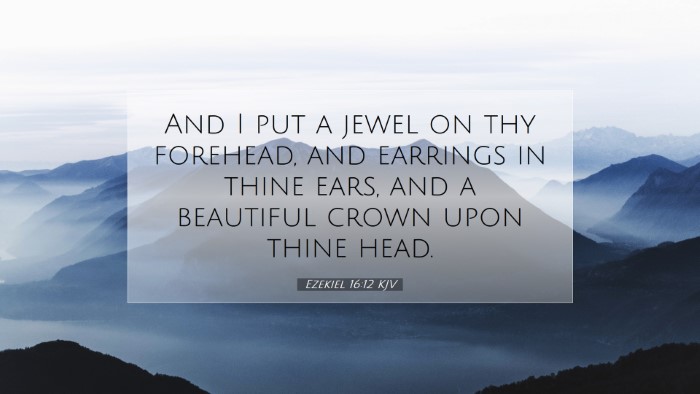Ezekiel 16:12 - A Comprehensive Commentary
Verse Context: Ezekiel 16:12 states, "And I put a jewel on your forehead, and earrings in your ears, and a beautiful crown upon your head."
Introduction
The book of Ezekiel is rich in symbolism and prophetic imagery, presenting a vivid account of God's dealings with His people. In Ezekiel 16, the prophet uses an allegorical narrative to reveal the unfaithfulness of Israel, personified as a woman abandoned but later adorned by her divine benefactor. Verse 12 encapsulates the lavishness of God's grace and the dignity bestowed upon His chosen people.
Historical Context
To understand this verse fully, one must consider the historical backdrop of Israel's journey. Following their exodus from Egypt, the Israelites were established as God's chosen people, yet they continuously strayed into idolatry and moral decay. The metaphor of Israel as an unfaithful wife starkly highlights their spiritual betrayal against Yahweh.
Theological Insights
- Symbolism of Adornment: The jewels mentioned in this verse symbolize the beauty and honor that God bestows upon His people. The adornment signifies not only their status but also God's commitment to their welfare.
- Covenant Relationship: The act of adorning Israel represents the covenant relationship between God and His people. Just as a husband would adorn his wife, so does God express His love and favor towards Israel.
- Sovereignty of God: This verse exemplifies God's sovereignty in choosing and elevating His people despite their unworthiness. The adornment is a reflection of God's grace, showcasing His initiative in salvation.
Commentary Insights
Matthew Henry: Henry highlights the intimate and personal nature of God's dealings with His people. He notes that the adornments are a token of God's love and kindness. Henry writes that God does not merely provide for Israel's needs but goes beyond to adorn her with blessings, which reflects His character as a generous and loving deity.
Albert Barnes: Barnes points out that these adornments serve to demonstrate God's grace in contrast to Israel's unfaithfulness. He interprets the jewels as representative of the blessings of the covenant, emphasizing that though Israel has been ungrateful, God continuously lavishes His grace upon them.
Adam Clarke: Clarke provides a deeper exegetical perspective, noting that the specific adornments—a jewel, earrings, and a crown—serve distinct purposes. The jewel on the forehead symbolizes wisdom and understanding, earrings connotate attentiveness to God's voice, and the crown signifies royal privilege and authority as God's people.
Practical Applications
For pastors, theologians, and students of the Bible, this verse beckons several practical applications:
- Understanding Grace: Reflect on the enormity of God’s grace in the lives of believers. Just as He displayed grace to Israel despite their unfaithfulness, so too does He extend grace to us.
- Nurturing a Covenant Relationship: Consider the importance of honoring our relationship with God. Like an adorned bride, we are called to respond to His love with faithfulness and loyalty.
- The Call to Adorn Others: In light of God's lavish good gifts, believers are called to reflect His character by demonstrating love and kindness toward others, uplifting those who are downtrodden.
Conclusion
Ezekiel 16:12 encapsulates a profound truth within the narrative of Israel's relationship with God. It serves as a reminder of God's unwavering love and the call for His people to respond in faithfulness. By examining the depth of this verse through the lens of public domain commentaries, we glean insights that are applicable for spiritual growth and ministry today.


